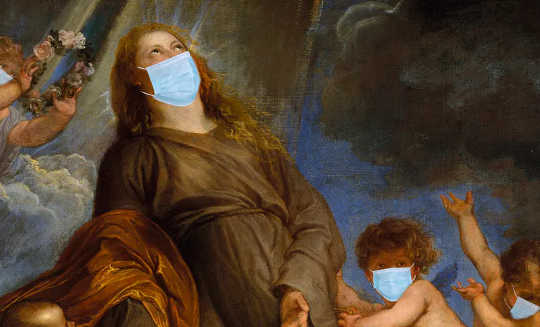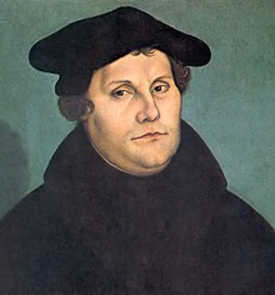
安东尼·范·戴克(Anthony Van Dyck)的圣罗莎莉(Saint Rosalie)为遭受巴勒莫(Palermo)瘟疫袭击而代祷 /对话(道歉)
Most of us are living through a year that is unprecedented in our lifetimes.我们大多数人度过了有生以来史无前例的一年。 Too young to remember the Spanish flu, we've grown up in a world where we take Western wonder drugs and life-saving vaccines for granted.太年轻了,无法记住西班牙流感,我们已经成长为一个世界,在这个世界中,我们理所当然地接受了西方奇观药物和挽救生命的疫苗。 We have no memory of a time when disease brought the world to a standstill or shut down entire economies.我们不记得疾病使世界陷入瘫痪或关闭整个经济的时期。 We could not have predicted life in Melbourne in 2020 would include a 5-kilometre travel limit or a curfew.我们无法预测XNUMX年墨尔本的生活将包括XNUMX公里的旅行限制或宵禁。
A longer view of history reminds us we are not the first community to experience and reflect on life during a time of plague or pandemic.对历史的更长远的回顾提醒我们,我们不是第一个在瘟疫或大流行时期经历并反思生活的社区。 So what might we learn from history as we continue to navigate life during a pandemic?那么,当我们继续在大流行中度过生活时,我们可以从历史中学到什么呢?
我们要怪某人
Given the ubiquity of religion in most human communities throughout history, it is not surprising reflections on pandemics often begin with God.鉴于历史上大多数人类社区普遍存在宗教信仰,因此对流行病的反思通常始于上帝,这一点不足为奇。 Plagues and diseases on such a scale feel “biblical” in the sense they are beyond the norm and therefore supernatural in some way.如此规模的鼠疫和疾病在某种意义上是“圣经的”,从某种意义上讲它们超出了规范,因此是超自然的。 While modern science gives us insight into COVID-19, we still look for someone, anyone, to blame for its presence.尽管现代科学使我们对COVID-XNUMX有了深入的了解,但我们仍在寻找有人来指责它的存在。
在古代,有人经常是上帝。
One of the earliest records of plagues comes from the Hebrew Bible.瘟疫的最早记录之一来自希伯来圣经。 Anyone who has celebrated Passover, read the biblical book of Exodus, or seen the animated Dreamworks movie Prince of Egypt will be familiar with the plagues that Moses (or God) unleashed on Egypt when Pharaoh would not free the enslaved Hebrews.任何庆祝逾越节,阅读圣经记载的出埃及记,或看动画梦工厂电影埃及王子的人,当法老王不会释放被奴役的希伯来人时,摩西(或上帝)在埃及所释放的灾祸就会很熟悉。
{vembed Y=GJleW4TCQM0}
Not all of the plagues were disease, but they all brought destruction and potential death.并不是所有的瘟疫都是疾病,但是它们都带来了破坏和潜在的死亡。 In that ancient narrative, a plague served two functions: it is divine punishment for injustice, and an assertion of religious power in the battle between Egypt's gods and the god of the Hebrews.在那个古老的叙述中,瘟疫起到了两个作用:它是对不公的神圣惩罚,是在埃及众神与希伯来神之间的战斗中宣称的宗教权力。 In the Hebrew Bible texts, Pharaoh's refusal to release the slaves is to blame.在希伯来圣经文本中,法老拒绝释放奴隶是罪魁祸首。 It is his fault.是他的错
Throughout history, humans have sought explanations for things that are beyond our normal control or understanding.纵观历史,人类一直在寻求超出我们正常控制或理解范围的事物的解释。 While God is often credited as the sender of plagues or pestilence – usually to teach some moral lesson – we tend to focus our wrath on human scapegoats.虽然通常认为上帝是瘟疫或瘟疫的发源者(通常是为了教一些道德课),但我们往往将愤怒集中在人类的替罪羊上。 In the 1980s, the HIV-AIDS viral pandemic was blamed on the gay community or在XNUMX年代,艾滋病毒/艾滋病病毒的大流行被归咎于同性恋社区或 海地人,揭示了这种观点背后的种族主义和同性恋恐惧症。
美国总统唐纳德·特朗普(Donald Trump)始终将COVID-19称为“中国病毒”反映了对替罪羊的类似渴望。 In its worst form, the blame game leads to在最坏的情况下,怪罪游戏会导致 广泛的报应 反对与该团体相识的人。
政府的角色是保护社区的关键
Another link with the past is the role of government in containing disease.与过去的另一个联系是政府在控制疾病方面的作用。 Governments have for centuries used quarantine as a way to preserve public health, often with great success.几个世纪以来,政府一直使用检疫作为维护公共卫生的一种方式,通常取得了很大的成功。
然而,对强迫隔离的抵制也有着悠久的历史,有报告称这些隔离 被“不守规矩” 并且需要在 大瘟疫 in 17th-century England.在XNUMX世纪的英格兰。 During this period, quarantine procedures在此期间,隔离程序 产生了明显的变化 比较城市时的死亡率。
在整个社区的健康与个人自由之间取得平衡是一项艰巨的任务。 凯伦·吉林斯 关于17世纪苏格兰瘟疫的社会历史的研究表明,虽然医师,治安法官和传教士都将瘟疫视为超自然的(无论是直接来自上帝还是来自自然界的上帝),但信仰者的反应却有所不同。
吉林斯描述 1603年,一位苏格兰传教士因拒绝遵守政府的医疗措施而被捕,因为他认为这些措施毫无用处,因为这完全取决于上帝。 The preacher was imprisoned because he was viewed as dangerous: his individual freedoms and beliefs were deemed less important than the safety of the community as a whole.传教士因被视为危险而入狱:他的个人自由和信仰被认为比整个社区的安全重要。
信奉宗教并不意味着反科学
但是,成为一个有信仰的人并不一定会构成一种反科学。
COVID怀疑论者在当代文化中具有多种形式,包括反宗教阴谋论者。 Yet anti-science views are often associated with people of faith thanks, in part, to some now然而,反科学的观点常常与信仰者相关联,这在某种程度上要归功于现在的某些观点 悲惨 例子 来自北美。
 马丁·路德(Martin Luther)照顾瘟疫中的垂死者。 Wikicommons
马丁·路德(Martin Luther)照顾瘟疫中的垂死者。 Wikicommons
16世纪的神学家和改革家马丁·路德(Martin Luther)是一个不相信理性的牧师的例子。 Luther wrote about living through the plague in a pamphlet titled路德(Luther)在一本名为“通过瘟疫生存”的小册子中写道。 是否可能逃离致命的瘟疫.
牛津大学教授 琳达罗珀 writes that while many fled Wittenberg in 1527 when the plague struck, Luther stayed out of a sense of duty to help nurse and care for the dying.文章写道,尽管XNUMX年鼠疫来袭时许多人逃离了维滕贝格,但路德仍然没有义务去帮助护理和照顾垂死的人。 This is what he thought all leaders should do.他认为这是所有领导人都应该做的。
His staying was not the decision of a martyr, nor was it born of a naïve idea that God would necessarily save or protect him.他的住所不是was道者的决定,也不是出于天真的想法,即上帝必然会拯救或保护他。 Luther,路德 罗珀写道,“提倡社会疏远”,使用医院以及根据他所处时代的科学采取必要的预防措施。 While he believed that God was ultimately in control, he also affirmed human responsibility.在他相信上帝最终将控制一切的同时,他也确认了人类的责任。 Luther harshly condemned those who went about knowing they were sick and spreading the disease.路德严厉谴责那些知道自己生病并传播疾病的人。
A historical perspective does not make living through a pandemic easy.历史的观点使人们难以过大流行。 But perhaps there is a small comfort in realising we are not the first community to live through such times, and neither will we be the last.但是也许意识到我们不是这个时代的第一个社区,我们也不会是最后一个。
我们发现很难平衡的事情-个体自由与群体,问责制与责备,科学与个人信念-已有数百年历史,并且具有深厚的人文底蕴。
而且,像几个世纪以来的其他国家一样,我们也有能力为病人和弱势群体提供令人难以置信的关怀和牺牲。
关于作者
朝圣者神学院新约高级讲师Robyn J. Whitaker, 神学院

相关书籍:
女性祈祷日志:52 周经文、灵修和引导祈祷日志
Shannon Roberts 和 Paige Tate & Co.
这本书为女性提供了一本指导性的祈祷日志,其中包含每周的经文阅读、灵修提示和祈祷提示。
振作起来:制止有毒思想的漩涡
通过珍妮艾伦
这本书提供了克服消极和有毒思想的见解和策略,借鉴了圣经原则和个人经验。
52 周后的圣经:女性为期一年的圣经学习
金伯利·D·摩尔博士
这本书为女性提供为期一年的圣经学习计划,包括每周阅读和反思、学习问题和祈祷提示。
无情地消除匆忙:如何在现代世界的混乱中保持情绪健康和精神活力
约翰·马克·科默
这本书借鉴了基督教的原则和实践,提供了在忙碌而混乱的世界中寻找和平与目标的见解和策略。
以诺书
由 RH 查尔斯翻译
这本书提供了一个被排除在圣经之外的古代宗教文本的新翻译,提供了对早期犹太和基督教社区的信仰和实践的见解。
























